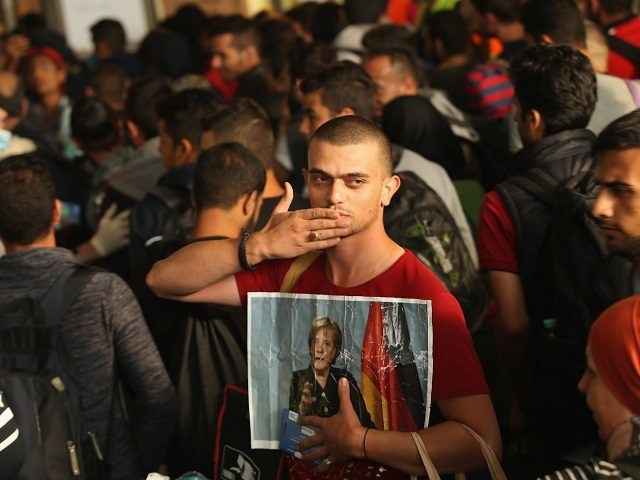Angela Merkel will distribute €6.85 billion (£5.98 billion) to Germany’s regions to help pay for accommodation, social housing subsidies, and language classes for migrants, according to a Reuters source.
The Chancellor’s electoral power base has been eroded since her unilateral decision to invite migrants into Europe in 2015, resulting in an influx of over a million people from the Middle East, South Asia, and the Global South more generally.
Perhaps consequently, the Christian Social Union (CSU) — Bavarian sister party to her Christian Democratic Union (CDU)– is facing significant losses to the increasingly popular, anti-mass migration Alternative for Germany (AfD) in regional elections this weekend.
The Reuters source claims that Merkel’s finance ministry has now agreed to distribute €500 million in migrant aid to Germany’s states to fund social housing subsidies, €1.8 billion for accommodation, and €2.44 for ‘integration’ programmes, such as language lessons for the so-called ‘New Germans’.
All in all, Reuters suggests that €15 billion will be funnelled into the country’s states and communes to support migrants through to 2022.
Merkel Tells Citizens Europe ‘Built on Tolerance’, Warns Against ‘Hatred’ of Refugees https://t.co/wOhOzywN7N
— Breitbart London (@BreitbartLondon) October 10, 2018
However, another Reuters report from as recently as May 2018 suggests total spending on “migrant-related issues” to 2022 will be an even more astronomical €78 billion, with the wire agency referring to a Der Spiegel report referencing another finance ministry draft document.
This report suggests social payments to migrants to 2022 will reach €21 billion, with spending on integration programmes including language lessons totalling €13 billion.
Germany allocated its entire national budget surplus to migrant crisis funding in 2016, a €6 billion spending spree.
Whether a spending spree on migrant integration of any description will boost the fortunes of Mrs Merkel’s allies remains to be seen, however, with polls suggesting the CSU will win no more than 35 percent of the vote this weekend.
This represents a dramatic fall from grace for the centre-right party, which since 1954 has never received less than 43 percent, and has been able to form a single-party government in the region after almost every election since 1966, with only a brief interlude from 2008 to 2013 when they were the senior partner in a coalition.

COMMENTS
Please let us know if you're having issues with commenting.